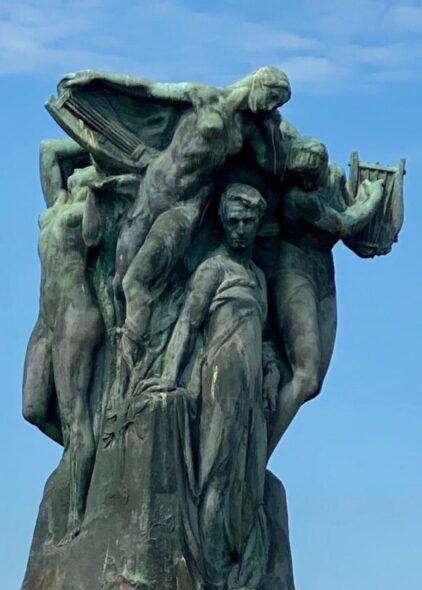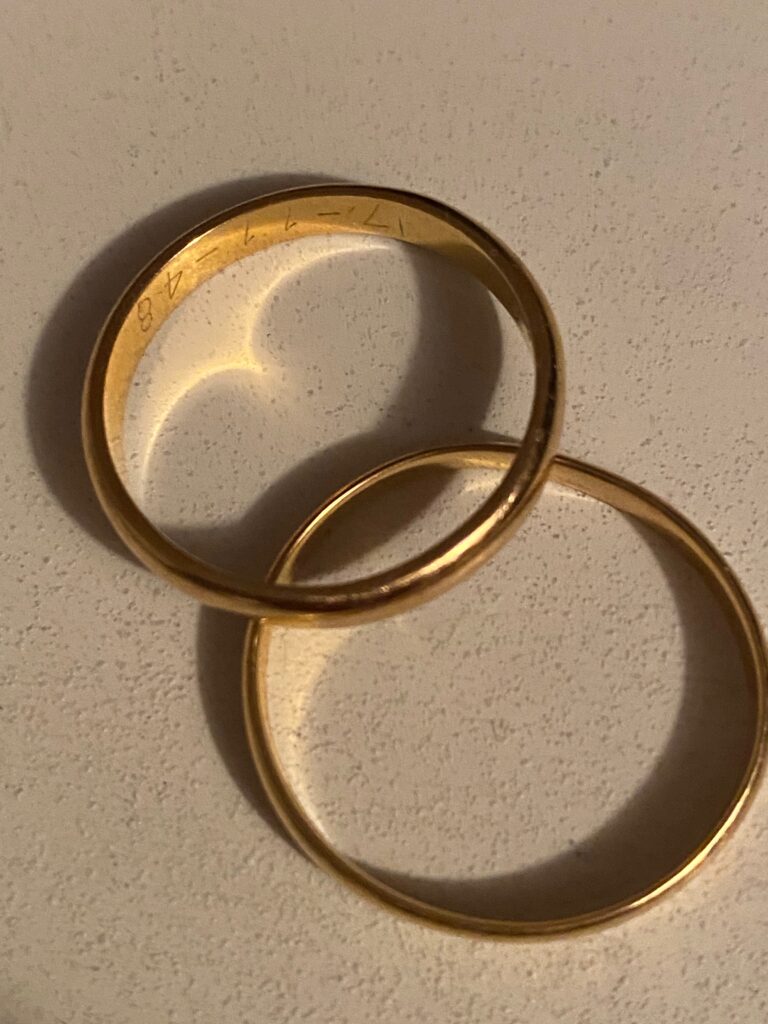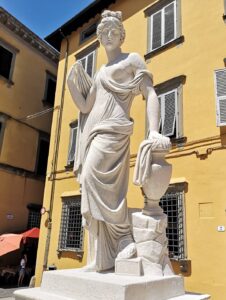
After the war, my zia Gina continued working as a teacher. The handsome South African soldier named Donny with whom she had fallen in love didn’t write as he had promised, so to divert herself she quickly fell for the attention of a puppy whom she called “Bijoux” – zio Carlo thought the name was ludicrous for a black and white mutt, so he named the little terrier “Bricco” meaning coffee pot, and the name stuck. Bricco proved untrue to Gina too, though, since he soon started sleeping at the foot of my mother’s bed every night instead of hers. Mom said he was a friendly obedient dog but not too bright, because her father would buy him a red leather collar to set him apart from the strays who wandered around, and he’d inevitably let people steal it (which they then surely resold.)
Poverty was rampant. Many young women had gotten caught up in the euphoria of the end of the war and had married GIs they hardly knew. The US government facilitated their meeting these young men by paying “signorine” (young ladies willing to participate) 1,000 lire per night to take buses out to dances where soldiers eagerly awaited their company. The sum was huge. With it the girls could afford to dress in rabbit fur coats and fashionable dresses. Their reputations may have suffered, but they were able to eat, and many found husbands who whisked them away to adventures of all types in the US.
Not everyone who became a war bride was poor, however. Mom often spoke of the daughter of a noble and very wealthy Lucchese family who fell in love with a dashing American officer from Pennsylvania. Her family was willing to let her marry him because in Italy being an officer signified that you were educated and from a good family. Her officer was handsome and the son of a train station chief. After a few years, however, the young woman returned to Lucca with two daughters; no further explanation was given about what had happened to the officer.
Following the end of the war, Mom was working hard to finish her Chemistry doctorate. With her coursework nearly completed, she had only to take an exam, finish her thesis and defend it. She often talked about how the professors were pretty lenient with her classmates who had just returned from the war. Some of the young men would wear wedding bands to elicit sympathy when they went to take their oral exams, so even though they weren’t too prepared the professors would pass them with a minimum score just to get them back on track with their lives. Everyone’s focus, she said was on finishing so they could find work. Mom’s goal was to become a chemist, buy a FIAT 500, and go to work in Milan.
Just getting to Pisa to take exams was an adventure. Until the roads and rails were rebuilt, the Army ran open trucks to transport students and others between Lucca and Pisa. Mom said that thanks to all the divots the ride was very bumpy, and thanks to some drivers’ twisted sense of humor, it could also be extra thrilling. It probably wasn’t too safe, but every truck bed was so full of standing passengers that there wasn’t much chance to fall over.
Meeting someone and getting married was not a topic of conversation at my house. It was all about schooling and career all the time. My father did his best by always treating me like “his kid” and not “his little girl”, which was terrific because he taught me all there was to know about the gadgets in his toolbox and repairing things. Together the three of us would peel wallpaper and paint the flats that my grandmother and parents owned. My father taught me how to sandblast and stain floors, and took me along to identify cracks to tar on the buildings’ flat roofs, but these activities were always considered extra and extraneous to doing my best in school. Going out with a group of friends, male and female, was great, but neither of my parents expected me to date or encouraged it – there was too much to accomplish in life before worrying about romance.
They clearly believed that when I met “the one” it would be obvious to both him and me, and it would be a lifelong commitment. They personified commitment, staying married to the end – no matter what – almost 62 years later. Most of what I have to go on about my parents’ romance though, comes from my maternal grandmother Nonna Marianna. Mom always focused mostly on how Dad’s family was from Lucca fora, which wouldn’t normally appeal to an “inner city girl” from Lucca drentro – but Dad’s good looks and charm won her over. Plus, his parents were from respectable families of successful contadini sul suo, meaning that they owned the many acres that they farmed. The details of what happened never came up until my Nonna nonchalantly spilled the story.
The news came when I was on one of my weekend “getaways” to visit Nonna at her villa in Vicopelago, a suburb of Lucca. I was a sophomore at Smith College taking a year abroad to study at the University of Florence, but I loved cruising down to Lucca in my FIAT 500 to learn all the ins and outs of the tiniest vicoli within the walls. My Nonna would introduce me to all the merchants in town, from whom, of course, she’d receive special discounts whenever she or her family made a purchase. She explained that this was a professional courtesy that they extended to one another and that there was no reason to be embarrassed – one should always ask for a discount because the Bedini were, after all, longtime members of this exclusive “club”.
Every other weekend, and every holiday, I would drive the hour and a quarter from my room in the stables of the Antinori Palace in Firenze, to Lucca, for a great (no-limit-to-the-hot-water) shower and my Nonna’s exceptionally great food.
During one such lunch, the topic of my Mom’s marriage came up. From the moment she met him, my Nonna had been smitten by my father’s jokes in 19th century Lucchese. She mentioned how handsome he was when he met my Mom – more handsome than Gary Cooper – and dressed to the hilt in elegantly tailored clothes made of luxurious fabrics. It was 1948. Lucchesi were struggling to pull two cents together. There was no fabric to make new clothes. There was no shame in wearing coats made of recycled US Army blankets dyed to hide the insignia. My mother, my Nonna thought, couldn’t help but be impressed by this new young man.
My future parents were at a dance in the ballroom of the elegant Palazzo Bernardini. Students who were club members of the University of Pisa’s Associazione Goliardica, the “GL,” were giving the dance for other university students. Dad was brought along by his very popular and handsome cousin Renzo Roberti who was studying veterinary medicine at the University. Dad was in San Concordio with his mother, Teresa, visiting their many relatives following the death of his father, Rinaldo, in Evanston. He’d become friends with his cousins when he’d visited them in 1925, when Mom was just two years old. My Nonno Rinaldo (known as Bobby) had pulled my father, who was 13, out of school along with his two younger sisters, to bring them and his wife to Lucca for nine months. My grandfather and two of his adventurous brothers had promised each other that they’d meet there then, but only Rinaldo made it to the reunion. The two who had gone to find their fortunes in South America never resurfaced.
While they were there, Dad developed an especially tight bond with his cousins Renzo and with Roberto Roberti (who later became Europe’s heavyweight boxing champion). He always talked about how much fun they had catching frogs and eels to eat in the Lozzori (a tributary of the Serchio River) long before pollution killed everything off. The farm experience fed his love of learning how to do everything mechanical and agricultural. No one cared that Dad’s Italian was the same as his father and mother’s which had stopped evolving in the 1890s, except for the addition of some Ital-English…
Renzo brought Dad to the dance, and Dad always said that when he saw my mother across the room, he fell in love with her at first sight. She had beautiful auburn hair pulled all to one side – a colpo di vento. He asked to be introduced. My grandmother, who loved to attend every dance that her daughters did, said they spent the evening dancing together, which is cool because he was a terrible dancer.
Details about what happened over the course of the next few days are sketchy, but it appears that they saw one another daily for about a week, keeping Mom’s little sister Laura employed as their “mocolo” (literally, candle-bearer/chaperone) to uphold Mom’s sterling reputation. Mom’s dog, Bricco, soon began throwing fits whenever Dad appeared at the door of via San Paolino,6, to pick her up, and had to be restrained. When Bricco understood that Dad wasn’t going away, he started barking incessantly and peeing inside the house, behaviors that got him banished to Nonno’s cousin’s house at the Urbani in the countryside at Vicopelago. After Mom married, she found out that Bricco had run away soon afterwards, never to be seen again.
Somehow, despite the moccolo, Dad managed to get my Mom into a car for a ride around the mura, and there somewhere, he proposed. (We only know this because 71 years later, my youngest son proposed to his future wife on the mura, and my mother confirmed that this was where my father also had proposed.)
Mom agreed to marry Dad, but a decision had to be made: my father’s ocean liner was leaving for New York just ten days later. Getting a ticket had been extremely difficult and expensive, and being responsible for his mother who spoke no English, he couldn’t let her make the trip back to Evanston alone. It would necessarily be at least six months before he’d be able to return for my mom if she didn’t leave with him right away. My parents decided they would marry sooner rather than later.
Then according to my grandmother, Mom developed a fever and couldn’t leave the house for the week before she married. Nonna said she rushed to pull together my Mom’s trusseau of beautiful hand sewn and embroidered silk nightgowns and undergarments. Her wedding dress was a dark blue suit, tastefully elegant, but not white, which wasn’t unusual given that people were still dealing with repercussions from the war.
The ceremony was scheduled for 7 am in the church of San Michele on November 7, 1948. They chose an early mass to avoid having curious onlookers crash the church, but Mom said there were many more people in attendance than usual. Their reception was catered by the Savoia and held at their house on via San Paolino. Their living room was jammed with their many friends and family, including the Conte Sardi who gave Mom a wooden bowl with felt mountain flowers to remind her of their many hikes in the Apuan Alps. Her close friend, Giorgio Giorgi, with whom she studied chemistry, gave her a small triangular ceramic dish. On the inside it was painted with the torso of a beautiful Modigliani-like woman, and on the outside it was covered in fine red leather. Her brother Carlo gave Mom a bestseller called Ho scelto la libertà (I Chose Liberty) in which he inscribed a physics formula for everlasting happiness = love. Dad received plenty of negative feedback from young men who had held out hope that maybe one day they could have been the one to win Mom’s heart. They ragged him for coming to Lucca and stealing one of their best women in less than three weeks. He retorted that he knew a good thing when he saw it, and that they’d had years to take action, but hadn’t. Dad was tall so no fighting occurred.
My mother and father honeymooned for a night or two at the Hotel Baglioni in Firenze and then left as scheduled on an English cruise ship from the port of Genova to Halifax Nova Scotia, New York City, and a new life in Evanston, Illinois.


